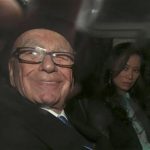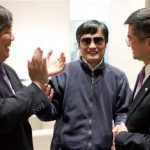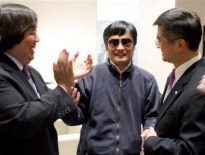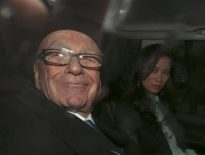(Reuters) – French President Nicolas Sarkozy made a
last-ditch appeal to far-right voters on Thursday after failing to land a knockout blow in a heated televised debate with
Socialist rival Francois Hollande before Sunday’s decisive runoff.
Hollande, ahead in opinion polls by six to 10 points, was calm and unflappable during the nearly
three-hour debate on Wednesday while the conservative Sarkozy, struggling to catch up with the moderate social democrat, was
often agitated and tense.
Commentators said the confrontation, watched by 17.8 million people out of an electorate of
44.5 million, was no game-changer and probably only reinforced voters’ opinions in a contest that has been as much about
style and personality as substance.
“It was a draw but as Mr Hollande started as favourite, he remains the favourite,”
wrote Francoise Fressoz in an editorial in Le Monde. “Mr Sarkozy did not manage to destabilise him, which was his objective
from the start.”
Returning to the airwaves on Thursday in a bid to convince waverers before campaigning ends at
midnight on Friday, Sarkozy appealed to the nearly one-fifth of voters who cast their ballot for the National Front in the
April 22 first round.
“The opinion polls are lying. An election has never been this open … It’s even more open
after the debate,” Sarkozy told RTL radio.
“I want to speak directly to National Front voters. Who would benefit if
you cast a blank vote? It would benefit Hollande, the regularisation of (illegal) immigrants, crazy
overspending.”
Television commentators said Sarkozy had performed “like a boxer” in Wednesday’s debate and Hollande
“like a judo fighter”, using flashes of wit and interjections to unbalance his rival.
“Hollande presides over the
debate,” left-wing Liberation wrote on its front page, while the right-leaning Le Figaro, with a headline “High Tension”,
emphasised the bitterness of the exchanges. It noted that every euro zone leader to seek re-election since 2008 had lost, but
said divisions in the French left and Hollande’s outdated policies gave Sarkozy a chance.
Hollande, 57, was confident
and relaxed in the early exchanges of Wednesday’s contest, saying he aimed to be “the president of justice” and “the
president of unity”.
He said Sarkozy, also 57 and in office since 2007, had divided the French people and was using
the global economic crisis as an excuse for broken promises. “With you it’s very simple: it’s never your fault,” Hollande
said.
Sarkozy, fighting for his political life, repeatedly accused his opponent of lying about economic figures and
reeled off reams of statistics in an attempt to swamp his adversary.
Deriding Hollande’s pledge to be a “normal
president”, the president said: “Your normality is not up to the challenge.”
SPARRING OVER EUROPE
The two
sparred over Europe, which has become one of the biggest issues of the election race, as well as the sickly economy, 10
percent unemployment, nuclear power and immigration.
“The example I want to follow is Germany and not Spain or
Greece,” Sarkozy said, declaring that he and German Chancellor Angela Merkel had saved Greece from an economic wipe-out and
avoided the collapse of the euro currency.
“Europe has got over it,” Sarkozy said of the crisis.
Hollande shot
back: “Europe has not got over it. Europe is today facing a possible resurgence of the crisis with generalised austerity, and
that’s what I don’t want.”
The Socialist, who vowed to push for a new focus on growth to allow the euro zone to
convalesce, said people across Europe were watching the election in the hope it would change the bloc’s economic direction
for the better.
Sarkozy, being punished for rife unemployment and a brash manner, is the most unpopular president to
run for re-election. He was the first in recent history to lose a first-round vote, with Hollande benefiting from the
anti-incumbent sentiment that has swept 11 euro zone leaders from office since 2009.
The streets of Paris were
unusually deserted with many people staying home to watch the debate, although some chose to follow the clash on television
screens at their local cafe.
“It has been 50-50. There is no clear winner,” said Jacques Dufoix, 36, a computer
engineer, after watching the debate in a central Paris sports bar. “I don’t think this is going to change the way anyone
votes. People have already made up their minds.”
A handful of opinion polls due to land before Friday evening will
measure any impact.
Sarkozy suffered a setback this week when far-right leader Marine Le Pen – whose 17.9 percent
score was the surprise of the first round – refused to endorse him. She vowed at a Paris rally on Tuesday to cast a blank
vote and told supporters to make their own choice, focusing most of her attacks on Sarkozy.
The issue of how to deal
with the anti-immigration crusader and her agenda has tormented Sarkozy’s UMP party all week, as a TNS Sofres opinion poll
found a third of voters agreed with the National Front’s positions.
The candidates tangled on immigration in the
debate, with Sarkozy attacking Hollande’s proposal to give long-term, non-European foreign residents the right to vote in
local elections.
Sarkozy began campaigning weeks after the more plodding Hollande, vowing to boost industrial
competitiveness, hold referendums on contentious policies, crack down on tax exiles and make the unemployed retrain before
receiving benefits.
More recently, seeking to court the 6.4 million National Front voters, he has vowed to cut
immigration and threatened to pull out of Europe’s Schengen zone of passport-free travel unless the European Union’s
external borders are strengthened.
(1 = 0.7603 euros)
(Additional reporting by Paul Taylor, Alexandria Sage, John Irish, Pauline Mevel,
Emmanuel Jarry and Elizabeth
Pineau; Editing by Paul Taylor)





